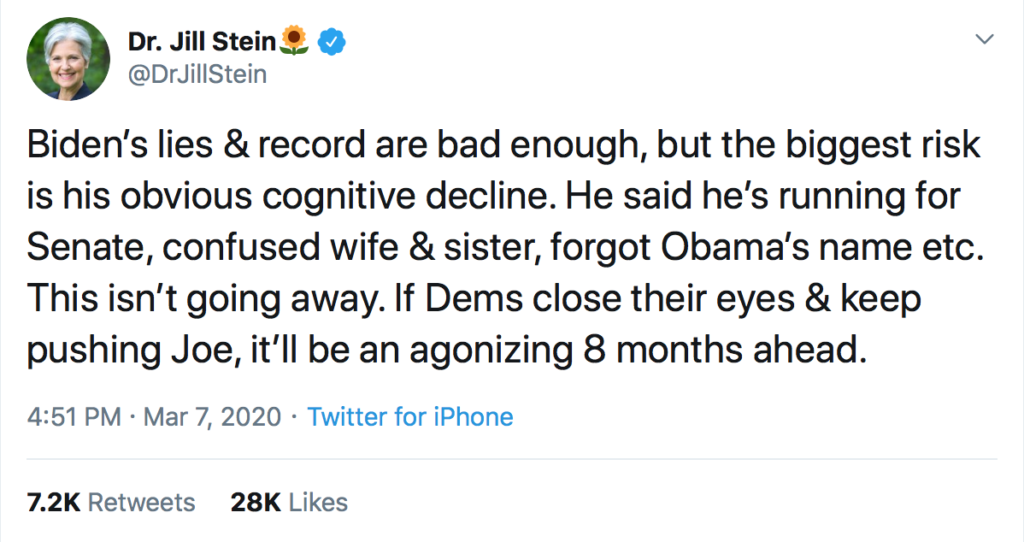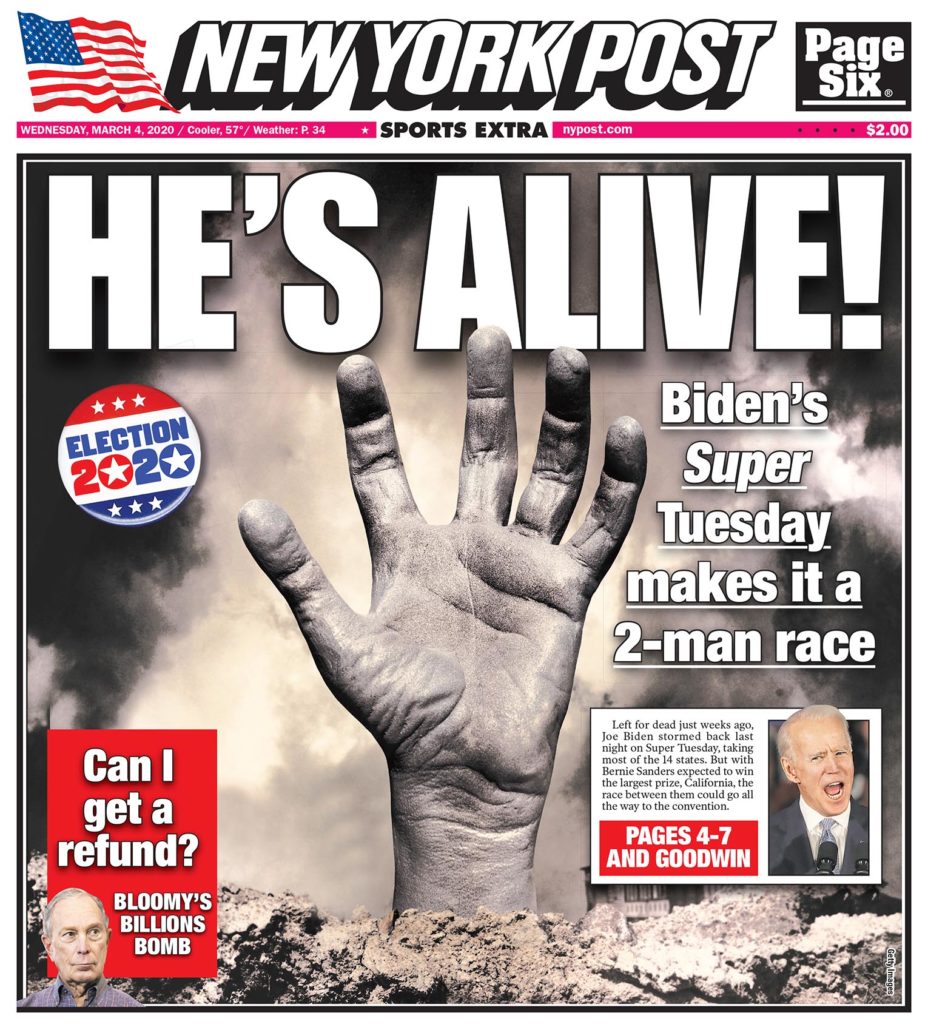In the end, the best man for the job might have been a woman.
When Sen Elizabeth Warren dropped out of the race for the Democratic presidential nomination last week, she told her campaign staff:
“We have shown that it is possible to build a grassroots movement that is accountable to supporters and activists and not to wealthy donors — and to do it fast enough for a first-time candidate to build a viable campaign. Never again can anyone say that the only way that a newcomer can get a chance to be a plausible candidate is to take money from corporate executives and billionaires. That’s done.
“We have also shown that it is possible to inspire people with big ideas, possible to call out what’s wrong and to lay out a path to make this country live up to its promise.
“We have also shown that race and justice — economic justice, social justice, environmental justice, criminal justice — are not an afterthought, but are at the heart of everything that we do.
“We have shown that a woman can stand up, hold her ground, and stay true to herself — no matter what.”
Warren later addressed sexism in the campaign, saying “If you complain about it, then you are whining. And if you don’t complain about it, the rest of the women think, ‘what planet are you living on’?”
Sarah Smarsh wrote a New York Times opinion piece entitled “I am burning with fury and grief over Elizabeth Warren. And I am not alone,” while Benjamin Wallace-Wells wrote in the New Yorker that through her presidential run Warren “has managed to do something decidedly Presidential: she has defined a particular way of being American.”
Yet for all the outpouring of regrets at the end of her campaign – as she said on Saturday Night Live “I’m not dead, I’m just in the Senate” – the outcome was increasingly inevitable as she failed to break through and secure a single primary win, even in Massachusetts, the state she has represented since 2013.
So the great winnowing, from a hugely diverse Democratic field, has eventually brought us to a point where we’ve ended up with two old white guys – Joe Biden and Bernie Sanders – competing to go up against a slightly younger white-ish guy.
There is, of course, one woman left in the race: Hawaii Congresswoman Tulsi Gabbard, who as Business Insider commented, has “spent much of the election cycle on Fox News criticizing the party she’s running to lead.” Her strategy from here on remains unclear, but it would be kind to say that her path to the nomination is difficult.
Meanwhile, 2016’s third-party “spoiler”, Jill Stein, is back and pushing a social media narrative about Joe Biden.

But it now looks like the remaining race for the Democratic nomination will be a straight fight between the two wings of the party, and there are six more contests on Tuesday, with hundreds of delegates at stake.
* The up-to-date running delegate count is here
Biden, who found his voice with his convincing win in South Carolina, buoyed by a surge in African-American support, came out of Super Tuesday with an edge in delegates, while Sanders turned his fire on the party “establishment”, specifically how the endorsements of Pete Buttigieg and Amy Klobuchar boosted his opponent as the moderate wing coalesced around the former Vice-President.

Sanders certainly has a route to remaining competitive after Tuesday’s contests, but the key state looks like being Michigan, where Sanders famously defeated Hillary Clinton in 2016 despite being behind in opinion polls. And he has been going all-out in recent days, cancelling events in other states to concentrate on the Midwest, while reaching out to the state’s muslim voters and, through the endorsement of Rev Jesse Jackson, African-Americans.
It may be too late, though.
Biden held a rally in Detroit on Monday night, where he unveiled two more high-profile endorsements from former opponents for the nomination: Kamala Harris and Cory Booker. Biden also picked up the endorsement of Michigan Governor Gretchen Whitmer, who cited Biden’s role in the auto bailout and its effect on the local economy.
Polls show Biden ahead, as he rides an apparently unifying wave of momentum, but as Will Bunch writes, we shouldn’t lose sight of the real significance of what happened on Super Tuesday
“Almost everything that happened… the spike in turnout, the willingness of people to stay in line for hours, and the shocking surge of votes and high-profile endorsements for Biden — including among people who liked other candidates better, but bought into the conventional wisdom that the moderate former veep is the best chance of ousting Trump in November — was driven by the same things.
“The fear that millions share that the American Experiment will never recover from four more years of a vainglorious authoritarian in the White House. That, and a determination to show that rest of the world that America is better than Trump.”
A noble aim. The next televised debate – the first in a one-to-one format – is in Arizona on March 15 and already the two camps are bickering about whether to have their guy stand up or sit down.
The good fight?
It’s worth reminding ourselves, in case we weren’t constantly aware, that the 2020 presidential election from here on out will be a war. Both in the remainder of the democratic primary – with threats still of a fractured party enduring a contested convention – and then, when a tired and financially stretched nominee takes on an entrenched incumbent with – still – loyal supporters and an historically large war chest in a general election with probably the biggest stakes the country has ever known.
The language we use to cover politics is littered with militaristic references: from “battleground states” populated with “shock troops” to win a “ground war” to the strategic dissection of a “campaign” itself.
While the president might talk of a trade war with China or we worry about the possibility of an actual war with North Korea; another country has been attacking our election security – the administration’s controversial acting intelligence chief said he would not be briefing congress as planned on Tuesday – and all the while we’re witnessing the weaponization of the apparatus of the state. Trump sees his presidency – as he sees his career in business – as a constant battle against anyone who opposes him.
Right now, though, the resources of the country absolutely should be engaged in a war – against the Coronavirus and the epidemic of disinformation that has accompanied it.
To return to the earlier point about the advanced age of the candidates in this year’s election, there is certainly now a risk of disruption that could prove a genuine threat not just to the organization of the campaigns over coming months, but to the health of individuals; as we’re seeing with the unfolding infections traced to the recent CPAC conference.
But perhaps most importantly, the administration’s handling of the crisis so far has wounded their own most important asset: credibility. As CNN’s Brian Stelter put it, misleading information is “infecting public trust.”
The president’s rambling appearance at the CDC last week led many to question how anyone – whether that’s other governments or his own citizens – can believe anything he says, as the emerging crisis increasingly exposes the limitations of his alternate reality. But the pushback strategy from the president’s supporters is also clarifying.
Under the headline “You can’t gaslight a virus,” Charles Blow writes in the New York Times that Trump’s “usual political tricks won’t work now,” while in the New Yorker, David Remnick addresses the actual practical danger from the president’s dissembling:
“Public-health officials worry that the consequences of living with a President and a general disinformation universe that undermine facts and science could have increasingly dire consequences. He is serving no one well. When you see a Trump supporter at a rally telling a reporter that she doesn’t believe that coronavirus exists, that it is an invention of the political opposition, there are reasons for that thinking. And such disbelief in the facts might well lead such a person to inadvertently make bad decisions about her health and her family’s health.”

For now, people seem to still be in their political “corners” – if you support the president, you probably still do; if you want to see him removed from office, nothing he has done in tackling this crisis has likely changed your mind. A new poll shows that 43 per cent of voters approve of his handling of the situation, while 49 per cent disapprove. The same poll also showed that Trump was “highly rated” on his handling of the economy.
But that was before yesterday.
As if the impending threat from the virus wasn’t bad enough for the nation’s confidence, global financial markets are currently taking another battering, this time after an oil production dispute between Saudi Arabia and Russia.
With the Dow falling more than 2,000 points on Monday – its largest point drop in a single day – the president is acutely aware that if the market continues to decline it deals a potential blow to his re-election narrative of a strong economy.
Just how much of a blow will only unfold in coming weeks.
See Also:
Mulvaney to be US Special Envoy Mar 7
South Carolina – Comeback Kid Set for Super Tuesday Showdown Mar 2
New Hampshire – Not Even The End of the Beginning Feb 13
Democrats Look to Put Iowa Behind Them Feb 8
And read Julia Flanagan on the Democratic debates here:
Democrats face Foreign Policy Test – December
The Road To Iowa Goes Through Georgia – November
A Dozen Deliberative Dems Debate – October
And Then There Were Ten… For Now – September
Time For The Democrats To Get Serious – July
Democrats Turn Up The Heat For Opening Debates – June
If you’re enjoying Northern Slant’s coverage of US politics in this election year, please join us on March 23rd for a discussion as part of the Imagine Belfast festival about the campaign, its possible outcomes and how they might affect us here in Northern Ireland. Details and tickets are available here.
